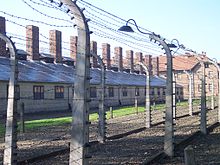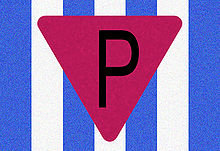- "Polish death camp" controversy
-
This article is about the controversy over the use of the term. For actual camps, see German camps in occupied Poland during World War II.
 Auschwitz, Nazi German death camp built in a part of pre-war Poland that was annexed by Nazi Germany.
Auschwitz, Nazi German death camp built in a part of pre-war Poland that was annexed by Nazi Germany.
 "The Mass Extermination of Jews in German Occupied Poland", note of Republic of Poland addressed to United Nations, 1942
"The Mass Extermination of Jews in German Occupied Poland", note of Republic of Poland addressed to United Nations, 1942
Polish death camp and Polish concentration camp are terms that occasionally appear in international media in reference to Nazi German concentration camps built and run by during the Holocaust in the General Government and other parts of occupied Poland. Usage of the term has been condemned as insulting by the Polish foreign minister Adam Daniel Rotfeld in 2005, who also alleged that it—intentionally or unintentionally—shifted the responsibility for the construction or operation of the camps from the German to the Polish people[1]. Polish newspaper Rzeczpospolita has criticized international media outlets, including Haaretz from Israel, as "holocaust deniers" over usage of the term. However, all foreign media articles so criticized by Rzeczpospolita (as of November 2008) make clear that the perpetrators were German, none claims Poles built the camps.[2]
Opponents of these terms argue that they are inaccurate, as they may imply that the camps—located in Nazi-occupied Poland—might have been a responsibility of the Poles (i.e. Polish), when in fact they were designed, constructed and run by Nazi Germany with no collaboration from Poland or Poles; and, used to exterminate millions of Polish Gentiles alongside Polish Jews, including Jews transported by the Nazis from across Europe.[3][4] Non-Polish media also make similar references to the German-run extermination program in Nazi-occupied Poland such as the "Polish Ghetto", "Polish Holocaust", "Nazi Poland"[5], etc. Polish Foreign Minister Adam Daniel Rotfeld in 2005 suggested that there are instances of "bad will, saying that under the pretext that “it’s only a geographic reference”, attempts are made to distort history and conceal the truth."[6]
An example of the controversy occurred when an April 30, 2004 CTV News report made reference to "the Polish camp in Treblinka". The Polish embassy in Canada lodged a complaint with CTV. Robert Hurst of CTV, however, argued that the term "Polish" was used throughout North America in a geographical sense, and declined to issue a correction.[7] The Polish Ambassador to Ottawa then complained to the National Specialty Services Panel of the Canadian Broadcast Standards Council. The Council did not accept Hurst's argument and ruled that the word "'Polish'—similarly to such adjectives as 'English', 'French' and 'German'—had connotations that clearly extended beyond geographic context. Its use with reference to Nazi extermination camps was misleading and improper".[8]
Concerns about the use of the term Polish death camp led the Polish government to request that UNESCO change the official name of Auschwitz from "Auschwitz Concentration Camp" to "former Nazi German concentration camp Auschwitz-Birkenau"[9][10][11][12][13] in order to make clearer that the concentration camp was built and operated by Nazi Germany. On 28 June 2007 at its meeting in Christchurch, New Zealand, the World Heritage Committee of UNESCO changed the name of the camp to "Auschwitz Birkenau. German Nazi Concentration and Extermination Camp (1940-1945)."[14][15] Previously, some media, including Der Spiegel in Germany, had called the camp "Polish".[16] The New York Times regularly refers to Auschwitz as Polish rather than German[17].
The use of terms explicitly mentioning "Poland" or "Polish" has been monitored and discouraged by the Polish Ministry of Foreign Affairs and the Polonia organizations around the world as well as by all Polish governments since 1989. The American Jewish Committee has also rejected the usage, stating that:
Auschwitz-Birkenau and the other death camps, including Belzec, Chelmno, Majdanek, Sobibor and Treblinka, were conceived, built and operated by Nazi Germany and its allies. The camps were located in German-occupied Poland, the European country with by far the largest Jewish population, but they were most emphatically not "Polish camps". This is not a mere semantic matter. Historical integrity and accuracy hang in the balance.[18]
The government of Israel has also deprecated the usage of this phrase.[19]
In 2008, due to the continued usage of the term term Polish in regards to atrocities committed and camps built and operated by the German state under Nazi leadership, the chairman of the Polish Institute of National Remembrance (IPN) issued a letter to local administrations with a call to add German before Nazi in all monuments and tables that commemorate the victims of Nazi Germany. As stated by the IPN official, while in Poland 'Nazi' is definitely connected to 'German' this is not the case everywhere in the world, and the change will help avoid any misinterpretation that the responsibility for the crimes against humanity committed in war-torn Poland wasn't specifically German. At the time several places of martyrology underwent renovations, and the new plaques were to make clear that the nationality of the people responsible for attrocities was not only German, but also Soviet Russian.[20] The incorrect phrase Polish concentration camps is used in school textbooks outside Poland to refer to the Nazi German concentration camps on occupied Polish territory.[21]
On December 23, 2009, writing in The Guardian, Timothy Garton Ash said:
Watching a German television news report on the trial of John Demjanjuk a few weeks ago, I was amazed to hear the announcer describe him as a guard in "the Polish extermination camp Sobibor". What times are these, when one of the main German TV channels thinks it can describe Nazi camps as "Polish"? In my experience, the automatic equation of Poland with Catholicism, nationalism and antisemitism – and thence a slide to guilt by association with the Holocaust – is still widespread. This collective stereotyping does no justice to the historical record.[22]
In 2009 Zbigniew Osewski, grandson of a Stutthof prisoner, announced he was suing Axel Springer AG for calling Majdanek a 'former Polish concentration camp' in article from November 2008 published in German press "Die Welt".[23] In 2010, The Polish-American Kosciuszko Foundation launched a petition demanding that four major U.S. news organizations endorse the use of the term “German concentration camps in Nazi-occupied Poland”.[24][25]
"Globe and Mail" informed on September 23, 2011 about “Polish concentration camps”. Canadian MP Ted Opitz and Minister of Citizenship Jason Kenney supported Polish protests [26].
Amazon offers Inside Hana's Suitcase DVD as a story about a suitcase from the notorious Polish death camp, Auschwitz [27], the same phrase is present on the first page of Student Reference of the movie, the word Germany on the last page[28].See also
- The Holocaust in Poland
- Nazi crimes against ethnic Poles
- Stephen Fry#Poland controversy
- Agency 114
References
- ^ Government information on the Polish foreign policy presented by the Minister of Foreign Affairs, Prof. Adam Daniel Rotfeld, at the session of the Sejm on 21st January 2005
- ^ Thomas Urban: "Populisten lassen googeln" (German)]
- ^ Piotrowski, Tadeusz (2005). "Project InPosterum: Poland WWII Casualties". http://www.projectinposterum.org/docs/poland_WWII_casualties.htm. Retrieved 2007-03-15.
- ^ Łuczak, Czesław (1994). "Szanse i trudności bilansu demograficznego Polski w latach 1939–1945". Dzieje Najnowsze (1994/2).
- ^ Polish Embassy in Spain protests against "Nazi Poland"
- ^ Piotr Zychowicz, Interview with the Minister of Foreign Affairs of the Republic of Poland, Prof. Adam Daniel Rotfeld Rzeczpospolita daily, 25th January 2005.
- ^ Latest News
- ^ Canadian CTV Television censured
- ^ Tran, Mark. The Guardian. (2007-06-27). "Poles claim victory in battle to rename Auschwitz."
- ^ Auschwitz Might Get Name Change, The Jewish Journal, 27th April 2006.
- ^ Yad Vashem for renaming Auschwitz, The Jerusalem Post, 12th May 2006.
- ^ UNESCO approves Poland's request to rename Auschwitz The Europe Channel , 27th June 2007.
- ^ UN to rename Auschwitz death camp Adelaide Now, 28th June 2007.
- ^ UNESCO World Heritage Committee. (2007-06-28). World Heritage Committee approves Auschwitz name change". Press release. United Nations Educational, Scientific and Cultural Organization.
- ^ Lilley, Ray. (2007-06-28). "UNESCO committee renames Auschwitz.", Associated Press, Guardian Unlimited.
- ^ BBC News. (2006-03-31). "Poland seeks Auschwitz renaming."
- ^ http://canadafreepress.com/index.php/article/18520
- ^ American Jewish Committee. (2005-01-30). "Statement on Poland and the Auschwitz Commemoration." Press release.
- ^ Two nations fed with the same suffering
- ^ (Polish) Akcja IPN: Mordowali "Niemcy", nie "naziści" (IPN initiative: "the Nazi Germans" committed Holocaust, not "the Nazis.") Fakty. Interia.pl, December 9, 2008.
- ^ Thenews.pl :: News from Poland (soft redirect) http://www.thenews.pl/international/artykul122671_poland-in-foreign-eyes.html
- ^ "As at Auschwitz, the gates of hell are built and torn down by human hearts". The Guardian (London). 2009-12-23. http://www.guardian.co.uk/commentisfree/2009/dec/23/poland-catholicism-nazis-difficult-past. Retrieved 2010-04-18.
- ^ Marcin Wawrzyńczak, "'Polish Camps' in Polish Court," Gazeta Wyborcza, 2009-08-14, at http://wyborcza.pl/1,76842,6928930,_Polish_Camps__in_Polish_Court.html
- ^ Petition against "Polish concentration camps," Warsaw Business Journal, November 3, 2010, at http://www.wbj.pl/article-51918-petition-against-polish-concentration-camps.html?typ=ise
- ^ Petition against "Polish death camps" The Kosciuszko Foundation
- ^ Canadian MPs defend Poland over 'Polish concentration camp' slur
- ^ Amazon.com - Inside Hana's Suitcase
- ^ Student Reference
External links
- Polish minister's speeches on the phenomenon
- Appeal against "Polish death camps" in Rzeczpospolita
- Polish Ministry of Foreign Affairs - Against "Polish Camps"
- Article on Irena Sendler but discusses issue of calling German camps as Polish
- Article on history of Auschwitz Concentration Camp in Poland but discusses issue of calling German camps as Polish
- Linguistic imprecision? (anti-Polish bias in the English-language media)
- Article which discusses irresponsible accusation against Poland including reference to German death camps as "Polish" death camps.
- Punishment for “slandering Polish nation” unconstitutional
- (Polish) Report of the Polish ministry on foreign usage of "Polish death camp" argument
Categories:- Misnomers
- Holocaust historiography
- Nazi concentration camps in Poland
- Controversies in Poland
Wikimedia Foundation. 2010.

